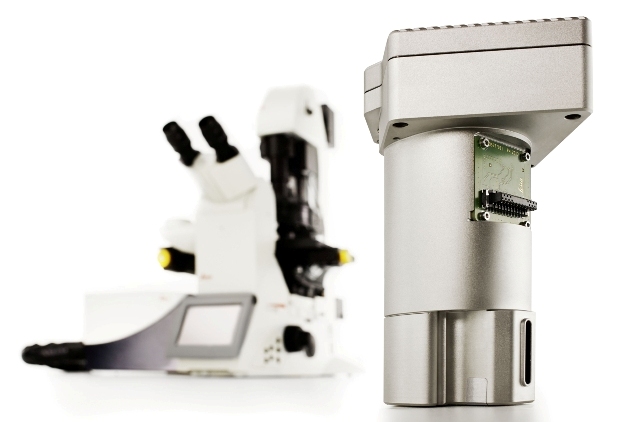Leica Microsystems introduces the Leica HyD SMD universal hybrid photodetector with superior characteristics for single molecule detection (SMD), which allows precise measurement of concentration and observation of fast cellular processes. It was presented at the annual meeting of the Society for Neuroscience (SfN) 2014 in Washington, D.C., and will also be shown at the annual meeting of the American Society for Cell Biology (ASCB), in Philadelphia, PA, USA from December 6 to 10.
 Leica HyD SMD – the universal detector for SMD and imaging.
Leica HyD SMD – the universal detector for SMD and imaging.
“The Leica HyD SMD is a class of its own. Virtually no detector afterpulsing and a fast instrument response time give precise and reliable data for FCS (fluorescence correlation spectroscopy) and FLIM (fluorescence lifetime measurement). Its high dynamic range and excellent contrast make it an ideal tool for super-sensitive imaging as well”, explains Leica Microsystems’ product manager Dr. Lioba Kuschel.
The Leica HyD SMD is an advancement of the proven Leica HyD, the hybrid detector for super-sensitive confocal imaging with the Leica TCS SP8. The hybrid detector combines the best characteristics of the classic photomultiplier tube (PMT) with the highly sensitive avalanche photodiodes (APD). This results in super-sensitivity and a large dynamic range combined with rapid detection speed and low dark noise.
Because the Leica HyD SMD is fully integrated into the spectral detection system of the Leica TCS SP8 confocal microscopy platform, all available excitation sources like UV lasers, visible light lasers and the highly flexible white light laser in Leica Microsystems’ portfolio can be used for SMD experiments. An active cooling system comprised of built-in Peltier cooling and additional external cooling reduces the specified dark noise of the Leica HyD SMD, resulting in the highest SMD data quality. The virtual absence of detector afterpulsing gives precise and reliable particle concentrations in FCS experiments, while short living dyes can be used to observe fast live cell processes due to the fast instrument response time of the detector.
At the ASCB, Leica Microsystems will also present the most recent addition to Leica Microsystems’ super-resolution microscope Leica TCS SP8 STED 3X: a pulsed 775 nm STED laser, which achieves sub 30 nm resolution through pulsed stimulated emission depletion technology.